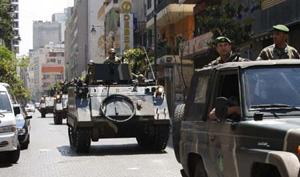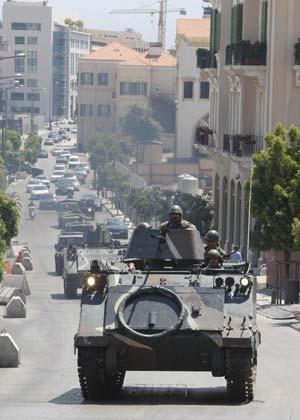World
Lebanon´s Hezbollah withdraws armed presence after army froze cabinet decisions
Source: Xinhua | 05-11-2008 09:33
BEIRUT, May 10 (Xinhua) -- Lebanon's Hezbollah-led opposition withdrew its armed presence from the capital Beirut on Saturday afternoon after the army froze earlier cabinet decisions against the Shiite group.
 |
| The Lebanese army in armoured personnel carriers advance to deploy in different districts of Beirut May 10, 2008. Hezbollah and its allies will end their armed presence in Beirut after the Lebanese army overturned government measures against the group, an opposition statement said on Saturday. (Xinhua/Reuters Photo) |
A Lebanese opposition statement said it will withdraw its gunmen from Beirut and end all armed presence and turn the city to the army so that "the capital will be in the hands of the army."
However, it maintained that it will peruse civil disobedience until its demands are achieved.
The statement came shortly after the Lebanese army called for all opposition militants to withdraw from the streets following Lebanese Prime Minister Fouad Seniora's urge to restore order in the capital.
"I call on the army to impose security on everyone in all areas and to clear armed elements from the street immediately," Seniora said in a televised address.
The Seniora cabinet on Tuesday decided to cease the communication network of Hezbollah and reassign Shqaier over his alleged links to the group.
Hezbollah refused the decisions and the party's Chief Hasan Nasrallah considered it a "declaration of war against the resistance."
Following Seniora's Saturday speech, the Lebanese army command then froze the government earlier decisions against Hezbollah, saying in a statement that it decided to keep airport security Chief Gen. Wafic Shqaier in his post and handle the private phone network of Hezbollah "according to public interest and resistance security."
Lebanon is treading on eggs as fears about another civil war rises after riots in Beirut left at least 24 people dead and dozens of others injured in recent days.
The sectarian fighting between anti and pro-government supporters in Beirut entered the fourth day on Saturday. The crackle of gunfire and sporadic bursts of rocket-propelled grenade echoed in many districts of Beirut during the fighting.
Lebanese Al Mustaqbal (Future) TV, mouthpiece of majority leader MP Saad Hariri's Future Movement, stopped local and cable broadcasting Friday morning after opposition gunmen siege the station and then turned it over to the Lebanese army.
Al Mustaqbal newspaper building in Ramlet al-Baida, southwestern Beirut, was also attacked with rockets and automatic gunfire at dawn Friday.
Meanwhile, Hezbollah gunmen heavily deployed in Beirut, particularly in districts of Hamra, Karakol Druze, Raouche, Mulla,Talet el-Khayat, Zaidaniyeh, Ras Nabaa, Basta Zoqaq Blat and Nweiri.
Local press said that Hezbollah gunmen seized nearly all of the Beirut's Muslim sector from pro-government militants in the past days.
 |
| The Lebanese army in armoured personnel carriers advance to deploy in different districts of Beirut May 10, 2008. Hezbollah and its allies will end their armed presence in Beirut after the Lebanese army overturned government measures against the group, an opposition statement said on Saturday. (Xinhua/Reuters Photo) |
Lebanon is currently facing the most serious political deadlock since the end of the 1975-1990 civil war. For the first time in its history, the presidential seat has been vacant for months since Nov. 24 of 2007 when former President Emile Lahoud ended his term and stepped down.
The presidency deadlock deepened the Lebanese political crisis as fears are mounting that failure in reaching a deal on the presidential candidate could result in more violence in the country.
Editor:Zhang Jia



